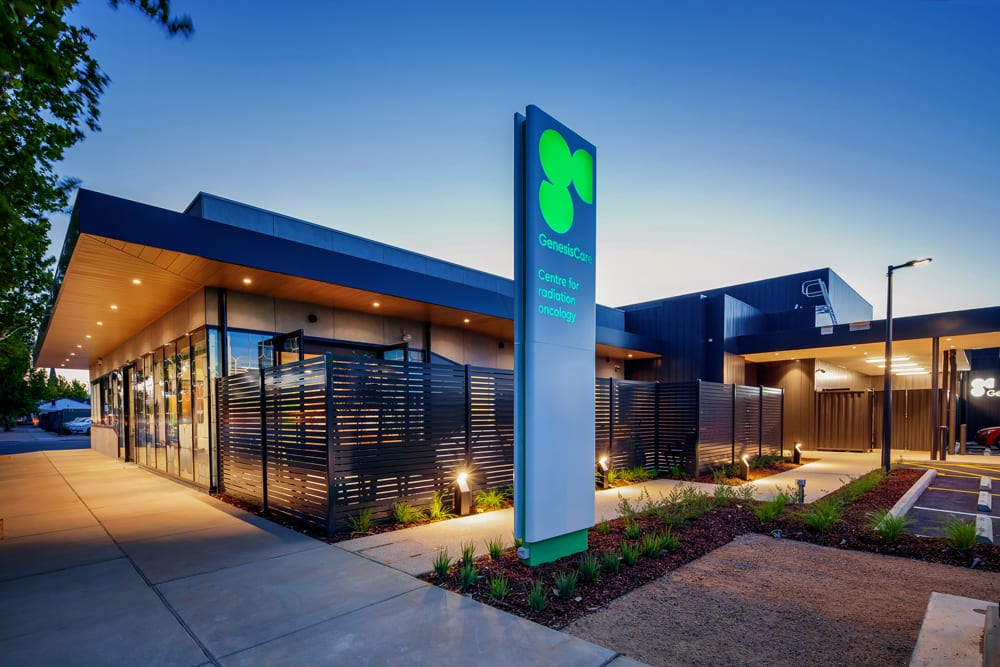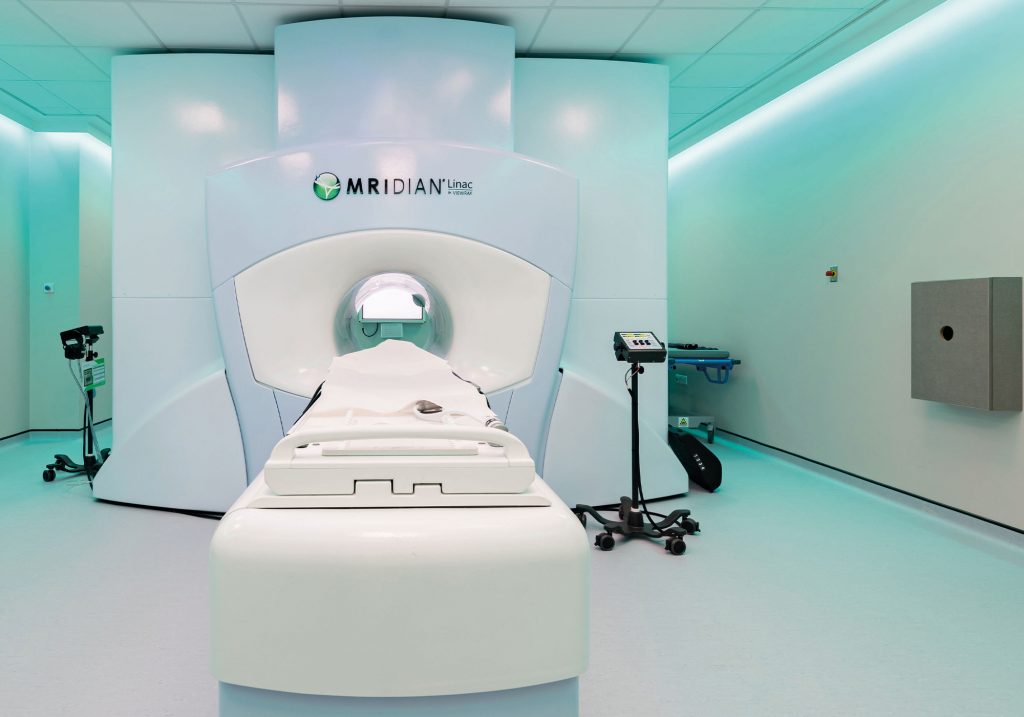What is the #FutureOfSABR? – Dr James Good, Twitter takeover key questions
On 25th March 2021, Dr James Good, Clinical Director of Stereotactic Radiosurgery was LIVE on GenesisCare Twitter feed to discuss emerging indications in Stereotactic Ablative Radiotherapy (SABR) & MR-guided radiotherapy. James had a fantastic session, with some interesting engagement from the SABR community.
Don’t worry if you missed it, we have all the key questions here for you to catch up.
James started the takeover with a poll to ask users across LinkedIn and Twitter if SABR will be a viable alternative to surgery for cancer treatment in five year’s time?
See the results below, from 99 responses received:57% Absolutely
27% Possibly
4% No way!
12% I’d like to understand more
Let’s keep the conversation going on #FutureOfSABR, if you have a question or comment, connect on Twitter with @GenesisCare and @DrJamesGood or make an enquiry here.
Key questions
Would bowel cancer ever be viable to be treated by SABR?
SABR can be used for secondary bowel cancer that has spread to the liver, lung, lymph node or bone. In certain situations, it’s also something we can use to treat rectal cancer that has come back despite previous radiotherapy and surgery.
Are SABR techniques widely used in the UK?
SABR has become more widely used in the NHS recently for primary lung tumours and some situations where people have more advanced cancer. At GenesisCare we offer SABR in all our centres. We also have the UK’s first ViewRay MRIdian machine at our centre in Oxford where we’re treating a range of cancers including lung, liver, pancreatic, prostate and kidney.
What disease sites are you using the ViewRay MRIdian for SABR purposes and what advantages or potential advantages are you seeing?
To date we’ve treated over 170 patients on our MRIdian – all with fully adaptive SABR for every fraction – 50% prostate cancer and 50% other targets like multiple liver mets, inoperable pancreatic cancer, pelvic reirradiation and central lung tumours. For prostate cancer, we’ve built on the experience of @FJLagerwaard that acute toxicity is reduced – and for other targets, we’ve found we can achieve better tumour coverage to higher doses than with traditional CT-guided SABR – especially pancreas.
We also have a selection of case studies here
Is there any number of liver lesions you restrict to when treating with SABR?
It depends! Size of mets & liver is important – as is the patient’s fitness and other factors. So far we’ve treated up to four liver mets on the MRIdian – it reduces the amount of radiotherapy dose to normal liver. We will be undertaking clinical trials to understand if treating >5 is feasible.
@PercyLeeMD agrees with this, he has completed a small phase 1 trial of 20 liver SABR patients. The outcomes were very promising with only 1 grade 3 GI toxicity event and excellent LC. What’s limiting # of lesions is sparing of normal liver for the most part.
How do you envisage SABR delivering positive outcomes for breast cancer patients when systemic therapies are so effective?
18/99 patients in the SABR-COMET trial had breast cancer. This trial showed a median OS of 50 mo for drug+SABR vs 28 mo for drug alone. SABR can also give patients a ‘chemo holiday’ that improves QoL. I agree that more data will help us improve patient selection.
Prostate cancer can be effectively treated with 5 sessions of SABR resulting in improved patient outcomes without the need for surgery – but do you think we can go even lower, and reduce the treatment time for men affected?
I’m sure we can treat prostate cancer effectively with less than 5 fractions. MR guided RT is one way to do this non – invasively. There’s already some evidence for this, and MR-guided radiotherapy is the ideal way to reduce treatment times without compromising cure rates or increasing side effects.
What are the thoughts on overall survival for patients with pancreatic cancer treated on MRL?
The CRISP meta-analysis showed SABR could prolong survival in comparison with chemo-RT, and there is some nice data showing even longer OS following high-dose SABR with MR-guidance. Our academic partnership with @oxfordcancer should help generate more data in support.
5 sessions of SABR has shown it can stop the growth of localised pancreatic cancer. NHS patients can access state-of-the-art MR-guided SABR through our Compassionate Access Programme. Is there any data yet from the programme or is it in research phase?
There’s enough retrospective data for it to be standard of care in many parts of the world – we hope that a randomised UK-led study will be one of the outputs from our Compassionate Access Programme.
How can NHS patients access the Compassionate Access Programme?
NHS patients with localised pancreatic cancer can currently access #MRIdian from throughout the UK, including Northern Ireland, via our Compassionate Access Programme – one patient has travelled from Scotland! More info available here
Do you have a similar Compassionate Access Programmes for treating intra/extrahepatic cholangiocarcinomas (not suitable for surgery)?
Not at the moment – but these patients can access SABR through participation in the ABC-07 trial. We hope we can run other Compassionate Access Programmes in the future.
Is there a role for treating advanced pancreatic cancer – e.g. with liver mets?
Sometimes we can help patients affected in this way – a patient with a primary pancreas cancer & single liver met has just completed treatment on our MRIdian after chemo. Many people with pancreatic cancer sadly have a number of liver mets making chemo the best option.
Patients with oligometastatic disease who have a stable disease or a response after chemo with local recurrence in particular could benefit from better symptom control via SABR, and for those with a small number of mets, SABR can allow a chemo-holiday and may improve survival.
Many advanced patients get an initial response to their chemo treatment, but no further options once resistance sets in. This is partly because NHS criteria for SABR eligibility are quite strict, and also because many see pancreatic cancer as a ‘systemic disease’ best treated with chemo alone. Advocacy work is important to change the outlook.
Are 5 lesions really the limit? Ongoing trials may eventually show meaningful clinical benefit of treating more. Finishing in fewer (maybe one?) fractions will make it more feasible to do so and MR guidance may drive adoption through improved visualization and user confidence.
Absolutely. If the SABR-COMET10 trial proves positive, the game changes totally. Could we eventually view treating multiple liver mets as we now view multiple brain mets.
MRL credentialing is a fantastic way for engaged and enthusiastic clinical oncologists to get involved in the future of radiotherapy and treat their patients using this novel technology, how can interested clinicians get credentialled?
Yes! Nearly 40 oncologists have already joined our credentialing programme – treating prostate, GI and lung tumours on ViewRay MRIdian – and anyone is welcome to join. Our second machine will go live in London in May, so the network is growing! For info: SABR@genesiscare.co.uk.
For more info contact SABR@genesiscare.co.uk





